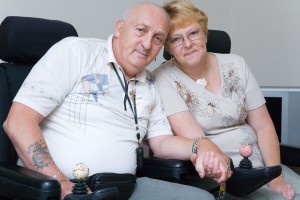Alex Fox, CEO of Shared Lives Plus, is perhaps better placed than most to acknowledge the increasingly important role of family carers as part of an overall package of support – but who is supporting them? In his latest blog, part of our Carers Strategy call for evidence series, he considers how health and care professionals can focus more on those who care for family and friends at home…
 State services and the expertise of health professionals are vital, but increasingly they are the junior partner in a team in which people with long term conditions and their carers are responsible for a much greater amount of the care.
State services and the expertise of health professionals are vital, but increasingly they are the junior partner in a team in which people with long term conditions and their carers are responsible for a much greater amount of the care.
Every time a substantial caring role comes to an unplanned end, it is as serious for the health and care system as an experienced nurse or care worker leaving their profession, coupled with a hospital or care home bed closing forever. When that role comes to an end because the carer’s own health has failed, there is a cost to their long term health, care and welfare benefit needs too. The goal we all need to achieve is emotional and financial sustainability for families involved in caring for relatives.

Breaks play an important part in emotional sustainability, but it is not enough only to increase the amount of breaks carers get from their roles. Carers’ benefit is an important source of income for many carers, but neither will it be enough to increase that benefit, if we do not help more carers sustain employment alongside their caring role.
For this strategy to go deeper than breaks and benefits, it will need to impact on the whole health and care system. Success will not be about the extent to which the system creates specific services for carers, but in how willing leaders are to rearrange all of their interventions around the role of family carers, as valued expert care partners.
 All health and care interventions can be delivered in ways which ignore carers, routinely exclude them from information and decision making, and take their contribution for granted. Or they can be designed to inform and include carers, routinely seeking permission to share information and ensuring that carers have on-demand access to expertise and emergency back-up as well as breaks.
All health and care interventions can be delivered in ways which ignore carers, routinely exclude them from information and decision making, and take their contribution for granted. Or they can be designed to inform and include carers, routinely seeking permission to share information and ensuring that carers have on-demand access to expertise and emergency back-up as well as breaks.
At Shared Lives Plus, we are supporting schemes to develop short breaks in which the Shared Lives matching process ensures that the two families get to know each other before they work together. Because Shared Lives combines paid and unpaid care in a family setting, rather than fixed and highly rationed time slots, it is flexible and can be adjusted around what is needed, enabling the individual and their chosen carer to spend time doing what they both enjoy. We are working with families to design Shared Lives support which fits around their lives and complements their vital role. We believe it is time for all health and care services to think this way.
Tell us how you would like health and care services to better support unpaid carers. If you receive care, provide it to others, commission or work within care and support services, we want to know your thoughts to help us build a strategy that works for everyone. We're open for submissions now until 30 June 2016. Get in touch!
1 comment
Comment by Georgina posted on
A step forward.......